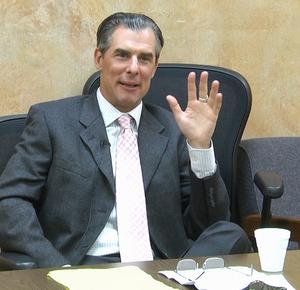Franz Boas Papers addressed in most recent Graves lecture

Matthew Bokovoy was the featured guest speaker during the Graves Lecture Series last week. The program can be seen on the CSC YouTube channel.
While conducting research several years ago for a book he wrote about the cultural history of the American Southwest, Bokovoy came across the Franz Boas Papers. The collection is heavily used because of Boas’ vast social network.
“I knew the collection was very significant,” he said. Bokovoy is a senior editor at the University of Nebraska Press. He joined the organization in 2008.
Boas, a German-born scientist, was one of three main founders of professional anthropology, incorporating it into the U.S. university system.
Boas worked diligently to understand the structure of non-western, non-Christian societies, according to Bokovoy. His correspondence includes letters to such intellectual dignitaries as Albert Einstein while the notable cultural anthropologist Margaret Mead was one of his students.
In addition to sharing the history of Boas, Bokovoy shared the background of a collaborative institutional project to print the Boas Papers at the University of Nebraska Press.
Other partners include the American Philosophical Society in Philadelphia and the University of Western Ontario, also home to the general editor of Franz Boas’s papers.
The APS is the nation’s oldest learned society and a major repository for the papers of humanists and social scientists, according to Bokovoy.
A Canadian Social Sciences and Humanities Research Council $2.5 million grant was awarded to the project partners in March of 2013. The funds will support the work of 20 college junior and senior scholars and graduate scholars working on the joint publishing project.
Although the funds were only intended to cover 17 volumes, Bokovoy is confident that his organization will be able to print 25 volumes with the grant.
In further explaining the value of Boas's work, Bokovoy said that at a time when the work of Charles Darwin was gaining popularity, social scientists were developing theories about the inherent inferiority and superiority of technologically sophisticated and technologically unsophisticated societies.
Most scholars associated with this ideology with Lewis Henry Morgan and his book "Ancient Society" in which he theorized that all societies evolve from primitivism, to barbarism, to civilized. This became known, in human science, as the comparative method.
“Boas sought to chip away at, and ultimately destroy, this mindset with many of his ground-breaking books. Boas was a pioneer in breaking down American isolationism and its incumbent intolerance and misinformation about cultural linguistic and biological diversity,” Bokovoy said.
Bokovoy said, “He emerged as a significant public intellectual. He was part of the progressive movement and became known as the defender of intellectual and cultural freedom.”
Boas advocated for protection of foreign born immigrants and was skeptical of Darwinian ideas. His legacy will include his field work and books and his theories about biologic diversity and racial science are long-standing, according to Bokovoy.
Category: Campus News, Graves Lecture Series
